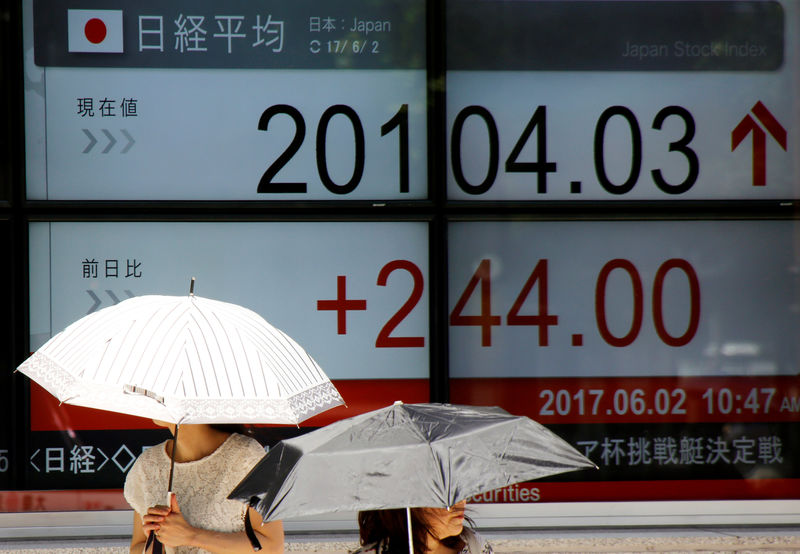By Ayai Tomisawa and Nichola Saminather
TOKYO/SINGAPORE (Reuters) - A 10 percent surge over six weeks swept Japan's Nikkei stock index above the 20,000-point barrier for the first time since late 2015 on Friday, without dispelling doubts about the rally's shelf life given the outlook for automakers, banks and the yen.
Data shows foreign investors, who make up 70 percent of trading activity in the Tokyo market, rushed to cover short positions as a rally from the year's low on April 17 gathered momentum.
But the data also shows foreigners avoided making heavy bullish bets, probably because analysts expect Japan Inc.'s earnings growth to falter.
The number of companies on the MSCI Japan index (MIJP00000PUS) with earnings estimates down from the previous month has climbed steadily since mid-April and is now at its highest since December, according to Thomson Reuters DataStream.
After 16 percent profit growth in the year ended in March, Japanese firms are expected to show slower growth in the year ending March 2018. According to Nomura, consensus forecasts for full year profit growth came down to 11.4 percent in May from 13.3 percent in April.
"The conservative earnings guidance has tempered sentiment toward Japanese stocks in the near term," said Jeremy Osborne, investment director at FIL Investments in Tokyo.
Notching a third straight week of exits, U.S.-based Japanese stock funds posted $194 million of withdrawals during the week ended Wednesday, according to Lipper data.
REASONS TO BE CAREFUL
Investors' biggest concerns are the potential for the yen to strengthen, undermining Japan's export driven corporates, and the murky outlook for the two biggest sectors in the benchmark index - automakers and financials.
"The problem is a big chunks of the market are exporters, and the biggest export sector is autos, and the outlook for the auto sector globally has turned down," said John Doyle, chief investment officer for equities and multi-asset at UOB Asset Management in Singapore.
"And the low interest rates that are persistent in Japan are not good for financials," Doyle added, explaining why he is neutral on Japanese stocks in the group's global portfolio.
New vehicle sales in the United States, Japan's top export destination, fell in April following disappointing numbers in March, signaling a long boom cycle may be losing steam.
Carmakers Toyota (T:7203) and Nissan (T:7201), for instance, have both underperformed the Nikkei's 5.6 percent gain this year, posting losses of 11 percent and 6.6 percent respectively. So have the biggest banks including Mitsubishi UFJ (T:8306), which has only gained 0.2 percent and Sumitomo Mitsui (T:8316), which has fallen 6.6 percent respectively.
The yen's
U.S. political turmoil, elections in Europe, and regional tensions arising from North Korea's missile tests have all given an unwanted boost to the yen.
Christian Nolting, global chief investment officer at Deutsche Bank (DE:DBKGn) Wealth Management, cited the currency factor as the main reason behind his neutral weighting on Japanese equities.
P/E RATIOS TURNING
For all their reservations, investors still clearly have an appetite for cherry picking.
Tokyo Electron Ltd (T:8035) has jumped nearly 50 percent this year after bright results on the back of strong chip manufacturing equipment demand, while factory automation sensor maker Keyence Corp (T:6861) has soared 26 percent.
The Nikkei, however, is trading at about 15.7 times earnings, compared with 18.7 in 2015 when it lingered above 20,000 points for a few months, DataStream shows.
While that makes the index significantly cheaper than the S&P 500's at 22.5 times earnings, investors remain hesitant.
The weaker sentiment is evident in Toyota and Nissan shares, which are trading around 10 times and 6.4 times their earnings, respectively.
In just three weeks between the last week of April and the second week of May, Japanese shares saw 1.5 trillion yen of inflows from foreign investors in futures on the back of a strong earnings season and receding political fears after the French election.
But they had sold 1.6 trillion yen in futures in the previous seven weeks, so short-covering seems to have run its course, analysts said. Investors have also returned to selling futures in the past two weeks.
"Investors are cherry-picking individual stocks... But they just finished short-covering in futures, and they probably won't buy soon unless the yen weakens," said Norihiro Fujito, a senior investment strategist at Mitsubishi UFJ Morgan Stanley (NYSE:MS) Securities.
"And when foreign investors don't buy futures, the Nikkei won't rise much."
